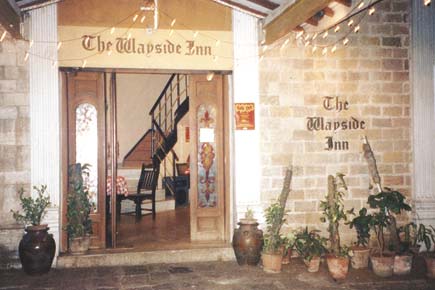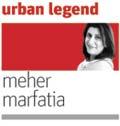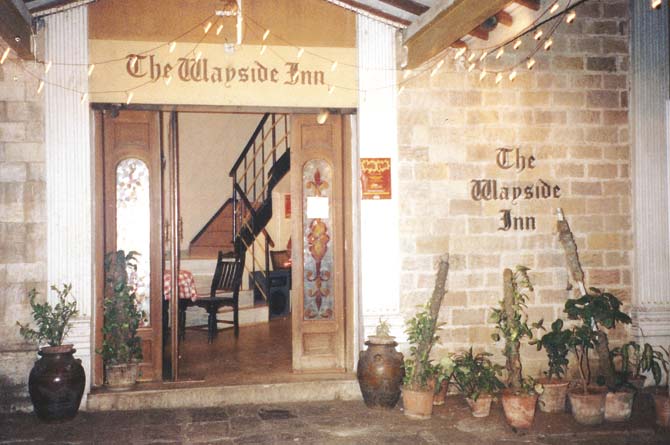Imagine the supreme law of the land written quietly in a small cafe hugging the corner of Rampart Row. That’s just what happened long before Kala Ghoda became the city’s tony art and eateries district

 Imagine the supreme law of the land written quietly in a small cafe hugging the corner of Rampart Row. That’s just what happened long before Kala Ghoda became the city’s tony art and eateries district.
Imagine the supreme law of the land written quietly in a small cafe hugging the corner of Rampart Row. That’s just what happened long before Kala Ghoda became the city’s tony art and eateries district.
ADVERTISEMENT
If pre-Independence years saw The Wayside Inn thrive as the hub of much fiery nationalist debate, its Table No. 4 was where Babasaheb Ambedkar lay down large tracts of the Indian Constitution in 1948. Crowning some watershed moments the iconic restaurant routinely witnessed was the sight of round spectacled, formal coated Dr Ambedkar diligently drafting his monumental work between pots of ordered tea. “Bent over foolscap sheets next to neatly rowed pencils and eraser, he’d ask for a pen from time to time,” recalls proprietor Pervez Patel.

The Wayside Inn. Pic/Pervez Patel
Though everybody’s favourite Dickensian café today assumes the avatar of only a takeaway counter selling sandwiches and brownies, it stays unforgettable. Those tall-ceilinged, triangular interiors stood sentinel to freedom history. Wayside birthed the country’s feistiest news magazine, share Pervez and his wife Pinky remembering “the crusaders three”. The dynamic Russi Karanjia, Benjamin Horniman and Dinkar Nadkarni huddled here to discuss creating the revolutionary tabloid Blitz. In an enigmatic gesture the trio kept a fourth chair vacant “Vox populi vox dei” the voice of the people is the voice of God, they believed. As if on cue, the horn of the old gramophone boomed a benediction: “The Lord gave the word” from the chorus of Handel’s Messiah.
The Patels with their daughter Farzana greet me with a rush of memories. Right from 1933 when Pervez’s grandfather, Maneckji Patel, took over Mrs Edwards’ cafe before she returned to England (after offering delighted patrons a silver service five-course lunch for 1 rupee 4 annas), Wayside attracted regulars ranging from radical intellectuals to penurious poets. In World War II its bar beckoned British and American soldiers whose rowdy brawls were settled with calls to the military police.
Maneckji to Ruttonshaw to Pervez, the family retained the tradition of comfort food, genteel warmth and waiters extending personalised service. Pinky laughs as she thinks of Ambrose, their Goan cook with a colonial hangover, refusing to let her step anywhere near the kitchen as he rustled up kidney pudding from a fiercely guarded recipe!
Besides hosting the architect of the Constitution, Wayside Inn shaped the thoughts of modern India’s finest socialist sons, ministers and lawyers like Madhu Dandavate, George Fernandes, Ashok Mehta, Madhu Limaye and MC Chagla. They came together happily to this home away from home, savouring its ambience of antique wood cabinets, crisp red tablecloths, vintage crockery and sparkling cutlery.
Culture coteries like the Thursday Club and Guppa Club met over daily menu specials including Parsi dhansaak and Anglo Indian dahl. Verse smiths Adil Jussawala and Arun Kolhatkar checked in (the latter’s poem “Kala Ghoda Cafe” was inspired by his haunt). As did then struggling Husain, Ara and Gaitonde. At gallery owner Kali Pundole’s suggestion, Pervez invited young painters to display their skill on his walls not hung with any air-conditioner. Instead, potted plant-bordered bay windows beautifully brought the sunny street in. Patrons were welcome to indulge in bohemian pleasures... dream a little dream, write a soulful song, read an edgy book, argue a passionate premise as balmy afternoons glided by.
Without a doubt this was the adda of our best and brightest. When economies of scale began to rule and Wayside gently downed shutters in February 2002, a mourning customer declared, “38 Kaikhushru Dubash Marg was no less a landmark than the Taj Mahal Hotel.” It was replaced by Silk Route serving Oriental fare.
Fortunate to frequent it for a while before, we sat there thrilled to know such worthies as David Sassoon, Cowasji Jehangir, Mohammed Ali Jinnah and Salim Ali had once graced the same chairs. Wayside was popular for almost a century with couples out on an affordable date. Romance bloomed level for all, from Tata directors holding hands with shy ladyloves to broke college kids making hotter moves as their chai cups cooled. In cosy cafés like this generations lingered at tables across ardent admirers, desperate for meals to never end. I’ve been popped the question at places like Leopold too. But the proposal I accepted was over Wayside Inn mixed grill lunch of course.
Meher Marfatia loves Mumbai. And adores Bombay. Reach her on: mehermarfatia@gmail.com
 Subscribe today by clicking the link and stay updated with the latest news!" Click here!
Subscribe today by clicking the link and stay updated with the latest news!" Click here!







